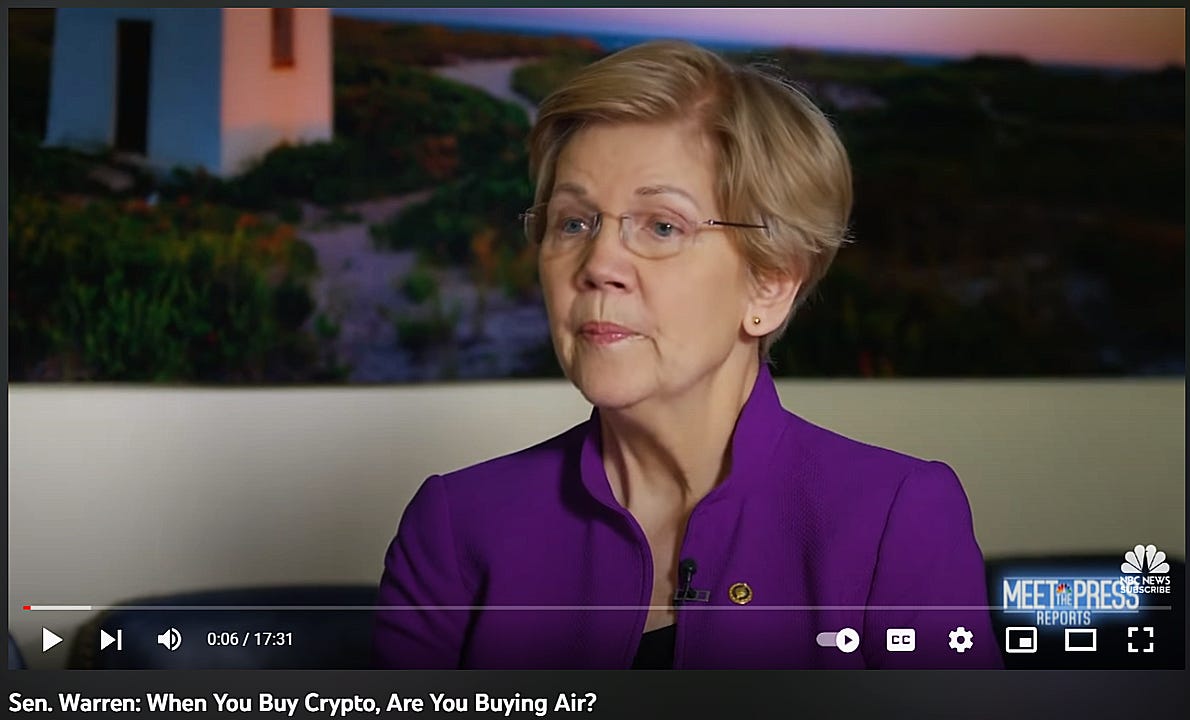The Genuine Crypto Critics Who Unintentionally Make It Stronger
Part I - Elizabeth Warren
It’s hard to believe that you are entering your fourth week at work. You, of course, are the hypothetical employee we created on June 1 for the purpose of telling a story through a person’s eyes who is determined to get to financial truths. You also have a hypothetical deliverable which is due exactly one week from today, the next investor alert for crypto.
During your first couple of weeks in the new position, you first looked at some of the crypto skeptics, Buffett/Munger, Aswath Damodaran and Jamie Dimon, all of which took the position that crypto is a speculative tool that you can trade, but not invest in. It does not have any intrinsic value and you have to sell it to somebody else. Then, you came across Bill Miller, Kevin O’Leary and Goldman Sachs, who all at some point, thought and acted exactly the same way, but, when Bitcoin came along, changed their stance. Then, during your third week, you researched Michael Saylor, Ric Edelman, Wharton, and Niall Ferguson. These are all well-known people and institutions at the top of the finance food chain, who somehow became Bitcoin supporters, and putting Wharton aside, dare we say Bitcoin maximalists? You brought it all together at the end of the week, realizing that, at its core, the story is one of adoption, perceived equivalence and incentives. What should you do now?
You started with crypto skeptics, then found a bunch of people/institutions who could have become crypto skeptics but decided to go in the other direction. You then found another group of people/institutions that are pro-crypto, and mostly Bitcoin. You want to come back full circle now and finish with another group of crypto skeptics. You remember the Fidelity saga around their decision to put Bitcoin into retirement accounts and decide to start with one of the fiercest consumer advocates you know: Elizabeth Warren.
“If I buy bitcoin, am I buying a share of stock, or am I buying a pork belly, or am I buying Euros? What am I buying?”
“You are buying air.”
“Oh wow, ok, you are going in.”
“I’m going in, because that’s the point.”
That’s exactly the type of response you expect from Elizabeth Warren. She rose to prominence in 2011 when she was running for a Senate seat in Massachusetts, in part due to a viral video where she made the point that every successful business or person must have relied on the public infrastructure as well as other people, hence the social contract warrants that they pay it forward. Barack Obama later leveraged elements of her speech into his own You Didn’t Build That message.
Warren ended up winning the Senate seat, which she still holds today. She became a household name by being a staunch advocate for consumer rights, picking up fights with large corporations. Building on that platform, she ultimately ran for the presidency in the 2020 election as a Democratic nominee. At some point, she was a frontrunner but later fell behind and exited the race, pledging her support for President Biden. Known for her candor and direct style, she didn’t mince her words when Chuck Todd, the veteran NBC correspondent asked her to comment on Bitcoin.
If you read the comments posted on the video above, you will notice that they are overwhelmingly negative. One commenter said: “After listening to her, I'm buying more. Thank you Senator Warren for giving me investment advice!” Of course, she was trying to do the exact opposite. Her goal was simply to warn people who view Bitcoin as an investment opportunity…
Intrigued, you start looking at other material. You remember reading about her letter to Fidelity (along with another senator, Tina Smith) when they announced that they will offer access to crypto in 401(k) plans. Here is the key quote:
Investing in cryptocurrencies is a risky and speculative gamble, and we are concerned that Fidelity would take these risks with millions of Americans’ retirement savings. (emphasis added)
You start seeing an aspect of the problem you didn’t fully appreciate before. It is clear that Warren is genuinely concerned about crypto. In fact, you fully share her concerns. That said, you know you must disagree with her when she describes the behavior of buying crypto as investing. “That particular word choice is extremely problematic,” you say to yourself. “Unknowingly, she is adding fuel to the fire. Despite having genuine concerns about crypto, yet by being loose with the language, she is actually elevating crypto to something that it is not, giving it more ammunition. What appears to be a criticism actually favors crypto by contributing to the perceived equivalence of crypto and stocks!”
A crypto skeptic criticizing crypto as a risky investment does more harm than good.
“Who else is doing that?” you wonder. You’ve created your list and set the tone with this week’s theme: Crypto critics who have genuine concerns about crypto but nevertheless call it an investment.




